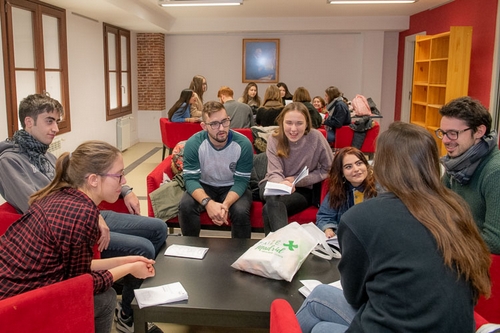With what shall I come before the Lord, and bow myself before God on high? Shall I come before him with burnt offerings, with calves a year old? Will the Lord be pleased with thousands of rams, with ten thousands of rivers of oil? He has told you, O mortal, what is good; and what does the Lord require of you but to do justice, and to love kindness, and to walk humbly with your God?
Sometimes it feels as if we live in a trembling world where every step is uncertain. The first chapter of the book of prophet Micah finds words for such experiences: it seems as if “valleys will split open, like wax before the fire, like waters poured down a steep place.” In the sixth chapter of the book of Micah, the reaction to this shaking of the foundations is initially a lot of activity, the understandable attempt to find something to do, to cope. It almost sounds hectic, exaggerated. But then the text becomes calm. The narrative stops itself and takes us into this quiet space: “He has told you, O mortal, what is good; and what does the Lord require of you, but to do justice, and to love kindness, and to walk humbly with your God?’”
“He has told you, what is good”. Hearing this, you might expect a list. A list that you just have to follow to do good and then the world will seem manageable and a little less threatening. What comes next is not such a list (although it might look like one), but an encouragement. An encouragement that invites us to journey along, into the text, into the space that the quiet rhythm of the text has opened up.
First of all: “To do justice”. Venturing in this space the text opens, one does not block out the world. Rather one recognises what is just and how to take justice seriously. To do justice means knowing what the most fundamental rights are, without which living together is not possible. I would add: upholding what is just also means acknowledging and pointing out injustices, even if it is not easy to recognize injustice and to endure the fact that people have suffered from unjust treatment.
Next: “Loving kindness, loving chesed”. The Hebrew term chesed is difficult to translate. Kindness, yes, but a kindness that is not just gentle and well-behaved and pleasing, but a form of solidarity and an engagement for communal life. I imagine it as a kindness that is rough and sharp-edged, where it is confronted with the despair of the world and our own hopelessness. It is a kindness that dares to envision spaces in which chesed can be lived, in which solidarity is possible – and to fight for them.
Finally: “And walk humbly with your God”. How can we imagine such an idea: walking with God, journeying with God? In the Hebrew text, the word tsanaʹ is used to describe this walk. It is an ambiguous word: it can be interpreted as humble, but also as considerate, attentive, thoughtful, calm, insightful, conscious. I understand it to mean: not just walking along, going along with it, but reflecting on this journey and continuously searching for images of what this journey feels like.
Additionally, I would offer the interpretation that there is a hidden journey in the text itself. You can walk this verse again and again, by going forwards and backwards: Walk calmly with your God. And love kindness. And do right. And love kindness. And walk calmly with your God. On and on. The journey goes on – and we go along with it and undergo it as much as we shape it.
I understand the journey mirrored in the text like this: in those moments when it is difficult to continue walking with God, it can be enough to recognise what is just, to name injustice, managing to create spaces of kindness for myself and others. And vice versa: if I don’t know how to go on and how to keep up hope for solidarity, for kindness, for justice, for anything at all: Then there may be an inkling that even the meandering walks in life have their purpose.
![]() How do I imagine “walking with God”? What images, words, stories... do I find for this journey?
How do I imagine “walking with God”? What images, words, stories... do I find for this journey?![]() What examples of kindness in solidarity on this journey can I share?
What examples of kindness in solidarity on this journey can I share?![]() How can we create spaces (in the Church and beyond) in which justice can be done and injustice be acknowledged?
How can we create spaces (in the Church and beyond) in which justice can be done and injustice be acknowledged?
Dr. Katharina Opalka (This meditation was first given to the participants in the 2024 18-35s Week in Taizé, August 2024)
